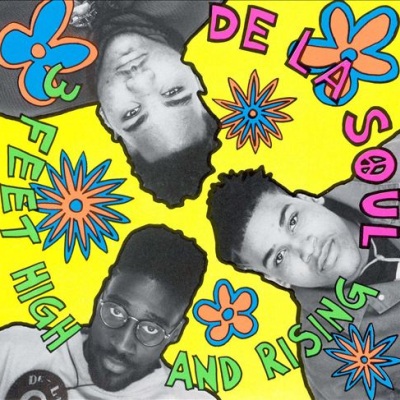
3 Feet High and Rising
著名的RAP乐队De La Soul的第一张专辑,赢得了无数的奖项,占据美国1989年度Hi Pop专辑榜首位,除入选滚石500强以外,在许多关于最佳专辑的评选中都榜上有名。比如The Face杂志把它评为1989年的最佳专辑,入选Source Magazine评出的百张最佳Rap专辑等。不但歌曲内容诙谐,专辑的名字也很有恶搞的味道,来自于Johnny Cash的一首名为"Five Feet High and Rising"的歌。 这张专辑在滚石杂志选出的500张历代最强专辑中排名第346位。 by John Bush The most inventive, assured, and playful debut in hip-hop history, 3 Feet High and Rising not only proved that rappers didn't have to talk about the streets to succeed, but also expanded the palette of sampling material with a kaleidoscope of sounds and references culled from pop, soul, disco, and even country music. Weaving clever wordplay and deft rhymes across two dozen tracks loosely organized around a game-show theme, De La Soul broke down boundaries all over the LP, moving easily from the groovy my-philosophy intro "The Magic Number" to an intelligent, caring inner-city vignette named "Ghetto Thang" to the freewheeling end-of-innocence tale "Jenifa Taught Me (Derwin's Revenge)." Rappers Posdnuos and Trugoy the Dove talked about anything they wanted (up to and including body odor), playing fast and loose on the mic like Biz Markie. Thinly disguised under a layer of humor, their lyrical themes ranged from true love ("Eye Know") to the destructive power of drugs ("Say No Go") to Daisy Age philosophy ("Tread Water") to sex ("Buddy"). Prince Paul (from Stetsasonic) and DJ Pasemaster Mase led the way on the production end, with dozens of samples from all sorts of left-field artists -- including Johnny Cash, the Mad Lads, Steely Dan, Public Enemy, Hall & Oates, and the Turtles. The pair didn't just use those samples as hooks or drumbreaks -- like most hip-hop producers had in the past -- but as split-second fills and in-jokes that made some tracks sound more like DJ records. Even "Potholes on My Lawn," which samples a mouth harp and yodeling (for the chorus, no less), became a big R&B hit. If it was easy to believe the revolution was here from listening to the rapping and production on Public Enemy's It Takes a Nation of Millions to Hold Us Back, with De La Soul the Daisy Age seemed to promise a new era of positivity in hip-hop.
